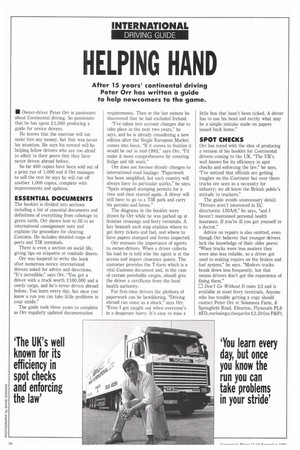HELPING HAND
Page 38

If you've noticed an error in this article please click here to report it so we can fix it.
After 15 years' continental driving Peter Orr has written a guide to help newcomers to the game.
• Owner-driver Peter Orr is passionate about Continental driving. So passionate that he has spent £1,000 producing a guide for novice drivers.
He knows that the exercise will not make him any money, but that was never his intention. He says his reward will be helping fellow drivers who are too afraid to admit to their peers that they have never driven abroad before.
So far 400 copies have been sold out of a print run of 1,000 and if Orr manages to sell the rest he says he will run off another 1,000 copies, complete with improvements and updates.
ESSENTIAL DOCUMENTS The booklet is divided into sections including a list of essential documents and definitions of everything from cabotage to green cards. Orr shows how to fill in an international consignment note and explains the procedure for clearing Customs. He includes detailed maps of ports and TIR terminals.
There is even a section on social life, giving tips on etiquette at roadside diners.
On was inspired to write the book after numerous novice international drivers asked for advice and directions. "It's incredible," says Orr. "You get a driver with a truck worth £100,000 and a costly cargo, and he's never driven abroad before. You learn every day, but once you know a run you can take little problems in your stride."
The guide took three years to complete as On regularly updated documentation requirements. Then at the last minute he discovered that he had excluded Ireland.
"I've taken into account changes due to take place in the next two years," he says, and he is already considering a new edition after the Single European Market comes into force. "If it comes to fruition it would be out in mid-1993," says Orr. "I'd make it more comprehensive by covering fridge and tilt work."
On does not foresee drastic changes to international road haulage: "Paperwork has been simplified, but each country will always have its particular quirks," he says. "Spain stopped stamping permits for a time and then started again. A driver will still have to go to a TIR park and carry his permits and forms."
The diagrams in the booklet were drawn by On while he was parked up at frontier crossings and ferry terminals. A key beneath each map explains where to get ferry tickets and fuel, and where to have papers stamped and forms inspected.
On stresses the importance of agents to owner-drivers. When a driver collects his load he is told who the agent is at the access and import clearance points. The customer provides the 1-form which is a vital Customs document and, in the case of certain perishable cargos, should give the driver a certificate from the local health authority.
For first-time drivers the plethora of paperwork can be bewildering. "Driving abroad can come as a shock," says Orr. "Even T get caught out when everyone's in a desperate hurry. It's easy to miss a
little box that hasn't been ticked. A driver has to use his head and rectify what may be a simple mistake made on papers issued back home."
SPOT CHECKS Orr has toyed with the idea of producing a version of his booklet for Continental drivers coming to the UK. "The UK's well known for its efficiency in spot checks and enforcing the law," he says. "I've noticed that officials are getting tougher on the Continent but over there trucks are seen as a necessity for industry; we all know the British public's attitude to truckers."
The guide avoids unnecessary detail: "Drivers aren't interested in EC directorate 120A/6," he says, "and I haven't mentioned personal health insurance. If you're ill you get yourself to a doctor."
Advice on repairs is also omitted, even though On believes that younger drivers lack the knowledge of their older peers: "When trucks were less modern they were also less reliable, so a driver got used to making repairs on the brakes and fuel system," he says. "Modern trucks break down less frequently, but that means drivers don't get the experience of fixing them."
1=1 Don't Go Without It costs £3 and is available at most ferry terminals. Anyone who has trouble getting a copy should contact Peter Orr at Solomons Farm, 8 Springfield Road, Elburton, Plymouth PL9 8ED, enclosing a cheque for £3.50 (inc P&P).
























































































